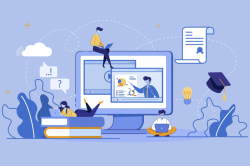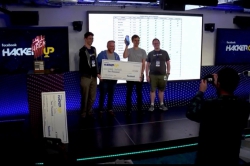What will the new course be about, and why is it so important?
Digital Culture is about understanding modern information technologies, their functions, and ways to properly apply them in work and everyday life. This has to do with not just smartphones or smart coffee makers, but also such issues as working with databases, machine learning, computer modeling, statistical analysis and much more.
The introduction of the new educational module will be conducted in accordance with ITMO’s roadmap for 2018-2020 that was approved by the Council on Global Competitiveness Enhancement of Russian Universities among Global Leading Research and Education Centers last October. Digital Culture was included in the “F” section of ITMO’s Code, which stands for Fundamental, that is the basic skills and competencies that both the university’s students and staff should possess.

A specialist who has skills in the field of Digital Culture knows how to apply the instruments offered by modern information technologies regardless of having education in the field of IT. What is more, there’s also the so-called Digital Ethics, which implies the understanding of the principles of communicating with other users, providing information about oneself, ensuring information security and knowledge of the country’s legislation that has to do with data management.
What’s the purpose of getting such knowledge? Information technologies have entered all aspects of our lives. The future belongs to the Internet of Things, blockchain and other distributed networks, automation and robot economy. The overall amount of data continues to grow, and processing it can contribute to the creation of new social services and introduction of innovations into industry and management. Such professions as data scientist and systems analyst are becoming all the more sought-after, even though there are still those who don't know what these specialists do. A great deal of communication, both business and personal, is conducted online, which defines the peculiarities of the generation’s reasoning and behavior. Therefore, it is in most areas of our activity that we face the necessity to store, search for and analyze vast amounts of information.

It is in order to adequately manage the surrounding information and get meaningful results that we need digital culture. This means that a person who possesses knowledge in this field understands the algorithms that can be used for processing and analyzing data, the tasks that have to do with data, the technologies that can be used for solving such tasks, and which results can be trusted.
Therefore, in modern times the knowledge of digital culture is absolutely a must for every specialist in both technical and non-technical sciences. This means that even if developing software, for instance, is not part of one's responsibilities, they still have to know how to properly relay the functional specifications to the programmers while properly explaining the issues that have to do with their area of expertise. Statistical analysis and Big Data processing are important for any tasks that have to do with economics. Specialists who work in the field of communications must possess skills in working with image editors, CMS systems, HTML layout and other digital instruments. Philologists have to know how to analyze texts, specialists in bioinformatics - how to process DNA sequences. This is what the economics of the future is about, and being literate in digital culture has already become indispensable for becoming a sought-after specialist in almost any field.

How do you plan to develop digital culture at ITMO University?
We’ll be doing that by introducing a new module of subjects that will be mandatory for every student starting with their first year of Bachelor’s programs. All these subjects will be included in the curricula of every program track, and the students’ knowledge will be assessed via an examination. The module is designed for six terms, one subject every term.
During the first two years, the students will study mandatory subjects. The first will be “Introduction to Digital Culture”. This course is designed to explain why digital culture is important, and how it can be used for one’s work and life. Each session will be dedicated to a particular section of information technology, like computer architecture, the basics of programming languages, Big Data technologies, computer security, etc. Also, this course will expand on the basic digital services: social networks, blockchain and smart contracts, electronic government, virtual museums and the like.

In the course of the second term, the students will follow a course on data analysis where they will learn about how data is stored and processed, as well as learn to analyze data and visualize the results. The third term will be dedicated to statistics, the fourth - to machine learning, neural networks, and databases. For the last two terms, the students will have the opportunity to choose courses from the list of electives, though following certain courses will imply having advanced knowledge in particular fields. For completing the Digital Culture module, the students will have to take examinations in both mandatory and elective courses, 18 subjects in total.
Master’s students will follow the Digital Culture module for two terms. That will include the “Data Processing and Analysis” and “Methods and Technologies of Applied Artificial Intelligence” subjects. As for students who already study at ITMO, those will have the opportunity to attend the new module’s courses as they choose.
There will be a difference in how these subjects will be taught to students following different program tracks. It’s only natural that for those specializing in the field of management, for instance, there’s no need to learn programming languages or machine learning methods used in data processing. Such students are to be taught to work with different data processing instruments that are aimed at those who do not specialize in IT. Then again, future programmers are to get advanced training in machine learning and statistics, as well as the algorithmic methods of data processing.
What is more, we are designing the courses in such a way that they will fit particular subject fields. For instance, when we’ll be teaching statistics to students studying biotechnologies, we’ll be using data from this field and expanding on the instruments used by accomplished biotechnologists. We believe that it is most important to integrate the skills in the field of digital culture into the knowledge the students get in their majors.

What about the format of the studies?
In order to fit the classes into the curricula of different program tracks, we’ll be mostly using an online format. To do that, we’ll create special educational videos with lectures by both ITMO lecturers and guest experts, including those from the industry. For instance, one of the lectures of the introductory course will be dedicated to services by Yandex.
Some lectures may be conducted in an on-site format, like lectures. he schedule will be developed based on suggestions of the Faculties’ boards. We’ve also planned workshops, where students will get the opportunity to ask questions concerning issues they have struggled with.
We've also decided to create several sets of practical assignments that will correspond to the subject fields of different faculties and departments so that the education in Digital Culture would be as close to real tasks as possible. What is more, students will get an opportunity to get advanced training in the subjects they got interested in at open classrooms organized as part of our program on development of digital culture at ITMO University.
In future, we’ll also be including our students into different IT projects that are conducted by the university’s scientists and students. This way, they will get an opportunity to apply their new knowledge in practice.

In order to follow the initial courses in Digital Culture, the students will need basic knowledge in information technologies: school-level maths and computer science, i.e. basic programming skills, basic algebra (theory of matrices), skills of working with MS Excel. As for such subjects as statistics, as well as the machine learning and neural networks modules, one would have to know the basics of advanced mathematics: algebra and mathematical analysis, that are given during one’s first Bachelor’s year.
I’d like to add that currently, we are working on the concept of Digital Culture’s development for ITMO’s staff, as well. We’ll be extensively introducing these competencies, and possessing them will soon become mandatory for anyone studying or working at the university.





